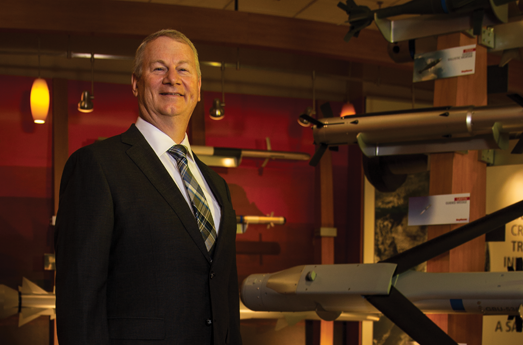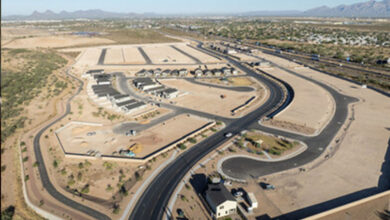
Raytheon, United Technologies Create Aerospace Giant
Merger Highlights Tucson’s Role as Aerospace Hub
By David Pittman
Raytheon Technologies has announced the consolidation of Raytheon and United Technologies, a move widely described as a “a merger of equals.”
Raytheon Missiles & Defense, one of Pima County’s largest employers and a business unit of the newly formed Raytheon Technologies, specializes in engineering excellence and is poised to play a leading role in the future of aerospace and defense.
The newly formed behemoth is one of the largest aerospace and defense companies in the world, with approximately $74 billion in net sales last year and a global team of 195,000 employees that includes 60,000 engineers and scientists. Raytheon Technologies’ corporate headquarters is in Waltham, Mass.
The merger resulted in combining Raytheon’s four divisions into two. In a good-news decision for Tucson, Raytheon’s Integrated Defense Systems, based near Boston, and its Tucson-based Missile Systems unit have been combined into Raytheon Missiles & Defense, which will be headquartered in Tucson.
Joe Snell, president and CEO of Sun Corridor Inc., Southern Arizona’s most prominent economic development organization, said the decision to locate this new headquarters in Tucson will bring longterm economic benefits to the city.
“Tucson competed very heavily to keep Raytheon Missiles and Defense here, and we were proud to lead that effort,” Snell said. “Major strategic decisions and cutting-edge technology to support the nation’s front-line defense system will continue to be made right here. The ripple effect of this decision will be felt in our region for years to come.”
Raytheon Technologies’ other units include:
• Raytheon Intelligence & Space specializes in developing advanced sensors, training, and cyber and software solutions to deliver the disruptive technologies its customers need to succeed in any domain, against any challenge. The division is headquartered in Arlington, Va.
• Collins Aerospace Systems, formerly part of United Technologies, specializes in aero structures, avionics, interiors, mechanical systems, mission systems and power controls that serve customers across commercial, regional and business aviation and military sectors. The segment is headquartered in Charlotte, N.C.
• Pratt & Whitney, formerly of United Technologies, designs, manufactures and services the world’s most advanced aircraft engines and auxiliary power systems for commercial, military and business aircraft. The unit is headquartered in East Hartford, Conn.
In the merger, the Otis business, which specializes in elevators, and the Carrier business, which manufactures air conditioning units, were spun off from United Technologies and into independent companies.
Raytheon Missiles & Defense employs about 13,000 people in Tucson, and 30,000 overall. The division is led by President Wes Kremer, an electrical engineer and U.S. Air Force veteran, who is responsible for a broad portfolio of air and missile defense systems, precision weapons, radar, command and control systems and advance defense technologies.
“We see the world through a global lens, and we’ve built a new solid foundation to bring end-to-end solutions to our customers to counter modern emerging threats,” Kremer said. “We want to be the place our customers turn to tackle their most complex challenges and toughest threats.
“The merger is about creating a leader in aerospace and defense,” he said.
Raytheon Technologies has been hard hit by the COVID-19 disruption and the significant downturn in the global commercial aviation businesses. At a May 7 first-quarter earnings call, top Raytheon officials announced the company would slice $2 billion in costs, halt share buybacks and furlough employees from its Collins Aerospace and Pratt & Whitney divisions.
“While our aviation units have been facing significant economic headwinds, the missile and defense segments of the company are on solid ground and experiencing record backlogs,” said Greg Hayes, CEO of Raytheon Technologies, who added that plans are in the works to move some commercial aviation employees into defense work.





